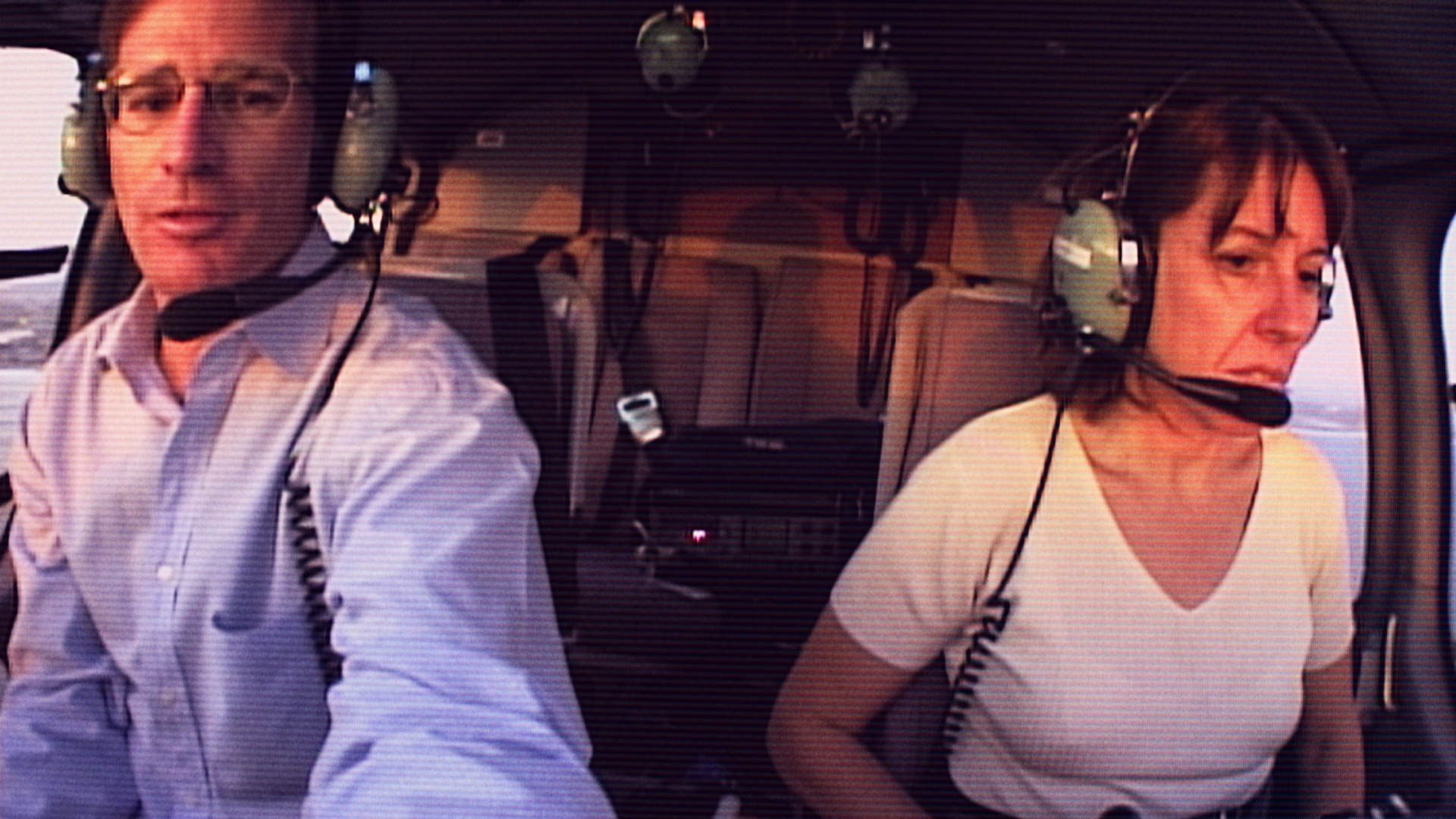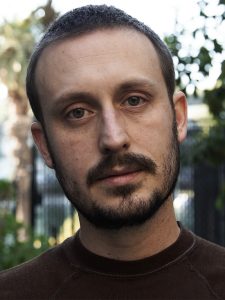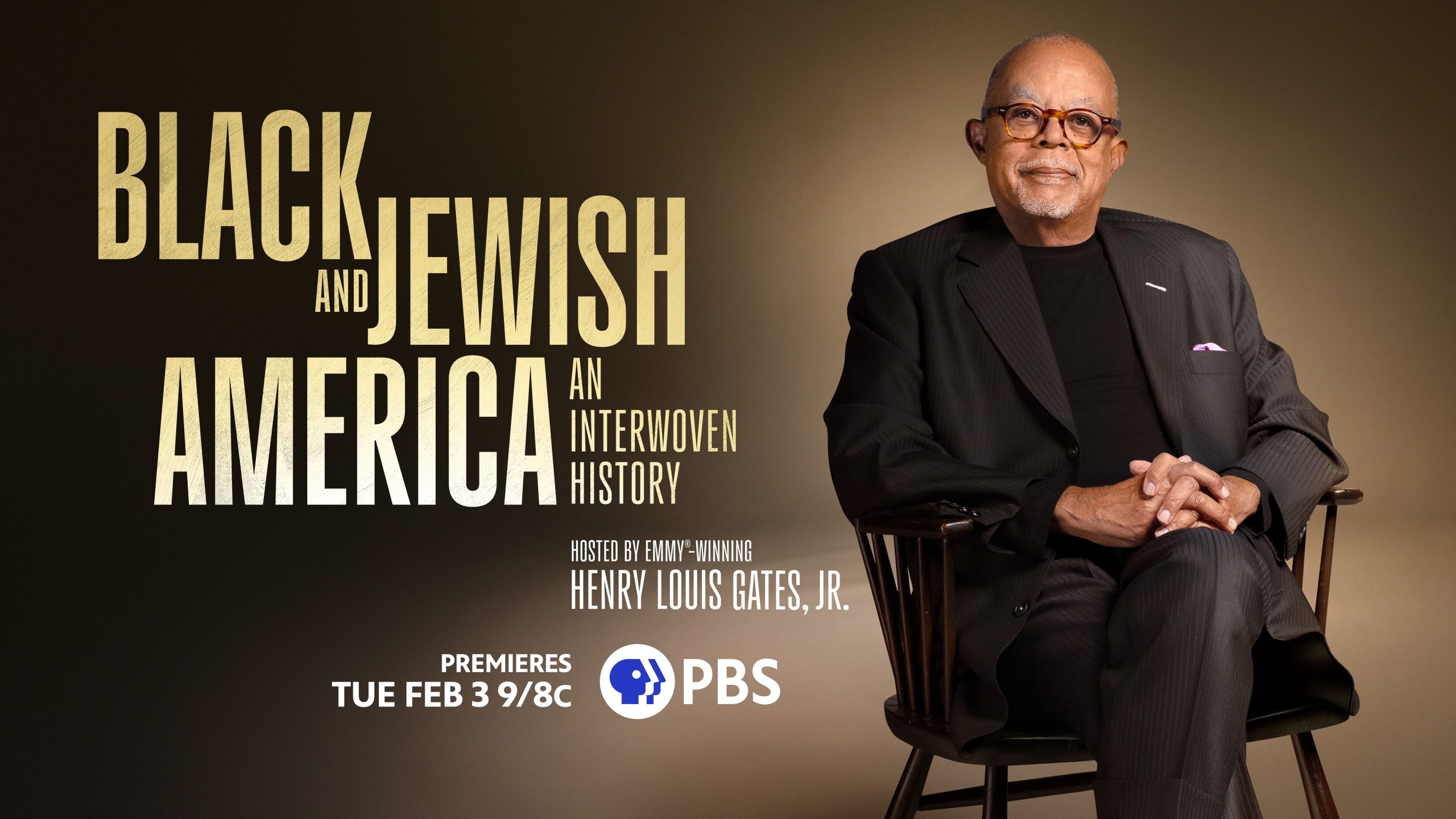
Matt Yoka spoke with Solzy at the Movies during the 2020 Sundance Film Festival about the new Los Angeles documentary, Whirlybird.
Yoka’s feature debut, Whirlybird, is about helicopter reporting pioneer Zoey Tur along with then-wife Marika Gerrad. They forever changed broadcast news as we know it when they reported on the 1992 Los Angeles Riots. Two years later, they hovered above the O.J. Simpson Ford Bronco pursuit during the 1994 NBA Finals between the New York Knicks and Houston Rockets. Their reporting efforts brought about adrenaline but at some point, it begins to take a toll. In addition to Zoey and Marika, the documentary also features their daughter, MSNBC reporter Katy Tur.
Greenwich Entertainment releases Whirlybird in theaters and VOD on August 6, 2021.

How thrilled are you to be premiering Whirlybird at Sundance?
Matt Yoka: I’ll be honest—I’ve been interested in Sundance as long as I’ve been interested in movies so it’s a real honor to be here. Have you been here a lot?
This is my third Sundance.
Matt Yoka: Oh, cool. What do you think about the movies this year?
They’re good.
Matt Yoka: Yeah.
There’s a lot of films that I want to see and just don’t have enough time for.
Matt Yoka: Right. So you saw Whirlybird?
Yes.
Matt Yoka: Thanks for taking the time because I know there’s a lot out there.
It was one of 10 pre-fest screeners that I was able to get to as far as features.
Matt Yoka: Okay, cool. Thank you.
When did you first learn about the Turs?
Matt Yoka: I’m trying to think of the very first moment when I learned of their career—Zoey Tur and Marika Gerrard. They were quoted in some article, I believe it may have been The New Yorker talking about high-speed pursuits. I was researching high-speed pursuits and helicopter journalism and I found them to be candid, interesting, and responsible for some of the biggest breaking news events in American history. That seemed like an interesting couple to talk to.
Where were you when the OJ Bronco chase took place?
Matt Yoka: Okay, so I was just talking to somebody about the riots and I remember where I was when the riots were happening. I was really young at the time but I don’t really remember where I was during the pursuit actually. I should check that out. I remember where I was during the verdict. Do you remember where you are during the OJ pursuit?
I remember it was the NBA Finals or at least the NBA playoffs because we were on vacation. All of a sudden, they break in picture-in-picture.
Matt Yoka: Are you a New Yorker?
I’m originally from Kentucky. I’m now living in Chicago.
Matt Yoka: It was Knicks vs. who? Do you remember?
I honestly have to look it up.
Matt Yoka: Yeah. That’s right. I remember a lot of Knicks fans were very upset about the Turs’ coverage.
Maybe it was Houston they were playing? (Over a year and a half later upon transcribing, my memory was correct in that it was the New York Knicks vs. Houston Rockets.)
Matt Yoka: Maybe. I’ll tell you this though. I was talking about this with Zoey yesterday. For me and your question, I think, validates that—it’s one of those news events in America where people remember not just watching it but remember where they were. They remember where they were, who they were with, what they were eating. It’s a very sensory-evoking news event. There’s only a few of those, I think, that people think of and I would put OJ on there except I happen to not be able to remember it. I’m gonna have to do some research. I’m gonna have to ask my parents because I was a kid when it happened.
With Zoey having a transition, how did you want to approach that with making this documentary? In some of these interviews, you’re hearing he/him. Was she fine with that?
Matt Yoka: When I learned of Zoey Tur, it was really through her career and it was her work that I was most interested in. The fact that she happened to be transitioning was just something she was going through at the time. I didn’t think that was any reason not to do the story although I did have to go through a process of trying to of learning more about how to tell that part of the story. I think that fortunately with it taking so many years to get it made, I was able to spend a lot of time with Zoey and I think gauge the way she feels about her transition and the way I think culture feels in general about it right now. That’s a rambling way of saying I wanted to focus really on her life, her past, and leading up to where we are today.
So now, with regards to the naming, Bob, he and all that, I didn’t coach any of the people I interviewed. I let them speak about it however they spoke about it. I will say, though, that all of the questions for the most part until the end of the film, we talk really about Zoey and Marika as passed in the archive. I wanted the audience to experience the story in real time. Somebody said recently that it was a period piece. I really did want to kind of transport people back to that time and so we live largely in the archive. In the archive, Zoey is identified often—both by herself and by others—as Bob. It would be very difficult to extrapolate it from the material. But I agree with you—complicated to navigate.
It’s my understanding that you were looking to tell a story about Los Angeles and it just so happened that you found their story.
Matt Yoka: Yes. It started that broad. I feel like now I’m gonna start asking everybody this question—have you seen Los Angeles Plays Itself?
No, I haven’t.
Matt Yoka: Okay, I think it’s a great film. It’s worth checking out. It’s a film essay about the city and this filmmaker uses clips of Los Angeles in film to understand the identity of the city. I was kind of interested in exploring the identity of Los Angeles through a topic or a subject. I honed in on a specific area, which is the era I grew up in the city and kind of wiggled my way through different events that happened in the city. You start to realize that helicopter reporting is uniquely a Los Angeles phenomenon so that’s what led me to the subject of helicopter recording.
When I learned about Zoey’s career, it was incredible because of just how many stories she broke, how many stories she was at the center of. Back then, it was like I was able to tell the story of the city by telling the story of her career and what I learned was her partner at the time, Marika, covered most of those stories together so you can tell all of those together through their career.
How many hours of footage did you have to sit through in order to edit the film?
Matt Yoka: Gosh, don’t give me flashbacks! How many do you think?
I don’t know. I mean, Apollo 11 had like 10,000 hours.
Matt Yoka: I’ll tell you right now—we digitized, 3200ish beta and three quarter-inch tapes that came up to about 2000 hours. I was feeling pretty good about what we digitized and accomplished. I went to a screening of Apollo 11 and I listened to him talk about how he uncovered all of that NASA footage—not just footage but audio—and I was blown away by him so props to the filmmaking team of Apollo 11. But yeah, anyway, I do feel like we’re kindred spirits because we are treasure hunters. What I think was special and unique about that archive is that it is their personal archive—it’s one source and it was all in a storage unit. Their life and their work was all integrated into these tapes cvering about 25 years.
How long was the initial cut?
Matt Yoka: (Laughs) Yeah, you’re onto the challenge, right?
Well, I forgot to print questions out! Looking through my folder and I’m like, Whirlybird, Whirlybird. When I turned on my laptop, I’m like, Oh, shit!
Matt Yoka: You lost them?
No, I forgot to write them!
Matt Yoka: Oh, for real? Well, you’re asking good questions.
I think I was trying to figure out is it just you or are the subjects going to be there?
Matt Yoka: Oh, right. Oh, sorry you didn’t know whether or not we were all going to be here. I think you are asking good questions so thanks for taking me on that journey. I am really proud of the digitization we did have the film—as an Angeleno and somebody who wanted to explore the city, the opportunity to preserve that piece of history felt really good.
The initial cut though was about two and a half hours. Even in those two and a half hours, I felt like we were already cutting out amazing stuff. What I always say is there’s so many stories in their story. They covered the Santa Monica Pier collapsing, for example. They captured that on tape. That didn’t make it in but there’s so many stories they were at the center of
As a documentary filmmaker, would you hope that more people digitize their archival footage to make these easier for documentary filmmakers, especially ones that are so heavily based on archive footage?
Matt Yoka: I think we’re in a really interesting point in documentary filmmaking because affordable video cameras in particular have been around now for several decades, and they’ve captured all sorts of stories, right? But enough time has now passed that I think we’re interested in exploring those periods of time. Take the 80s and 90s, for example. The 80s and 90s video tape became a big tool to capture moments. Now, I think you’re seeing a lot of people start to realize that within that, there are that there are archives and that that can be the foundation of a film.
There were films that I saw that inspired me like Grizzly Man and Senna that used archive in such a mesmerizing way in a way that that could tell character stories that were really moving and to edit them together in a way that made it feel like you’re watching a feature. I think we’re getting more sophisticated about how we can use archive in realizing the potential for it. Of course though, 20 years from now, I worry, though, that we’re going to be drowning in video and that it’s going to be very difficult to parse out stories because we’re just going to have an overwhelming amount of content that’s been documented. The 80s and 90s was a sweet spot, I think. Does that make sense?
Yeah. What thoughts do you have on the current landscape because we’re at this weird era where it’s like cinema, streaming. I mean, there are films that are not even getting a physical release and then G-d forbid that you want to watch it one day and it’s not even on streaming anywhere.
Matt Yoka: I can’t remember who said this but I was reading recently some interview with a filmmaker and he pointed out that some of his most important moments as a movie watcher happened at his home and this was before streaming happened, right. I related to that because I think that I, as a kid in high school, remember renting videotapes and taking them home and just getting my mind blown every time I was finding something at the video store.
I think that the home TV movie experience is a valuable place to experience cinema but of course, I think the immersive quality of a theater is so special and even more important today now that there’s so many more distractions. I think it’s vital that we’re there. I think streaming is great and streaming has been really good for documentary. I think streaming has probably played a huge role in getting more people interested in watching documentaries. Maybe but I’m not really an industry expert. I do subscribe to some of them. Do you subscribe?
Oh, yeah—because of work.
Matt Yoka: Oh, why is that?
Well, for voting reasons.
Matt Yoka: Oh. Like an Academy voter?
No but an awards-voting film critic.
Matt Yoka: Oh, really?
Yeah.
Matt Yoka: How does that work?
Netflix moved their press streaming platform from their website to the actual Netflix platform.
Matt Yoka: Oh, interesting. So you have to go through it to access it—of course. Well, do you have a Blu-ray player?
Yep.
Matt Yoka: Do you have a DVD player?
Well, I just play them in my Blu-ray player.
Matt Yoka: How about a VHS?
My parents have a VCR. We haven’t thrown it out because we still have tapes that we haven’t put on DVD.
Matt Yoka: Okay so getting back to digitizing—I think people assume everything that was on tape has been digitized. Every VHS video is either a DVD or is available on some sort of streaming site and it’s not. There’s a lot of interesting films and documentaries and all sorts of video content that exists maybe only on VHS right now. I encourage everybody to own a VCR and to scour their local Goodwill for some interesting tapes but yeah, anyway, think VCR still has a place.
(Matt wanted to keep talking but the publicist gave us the wrap sign).





